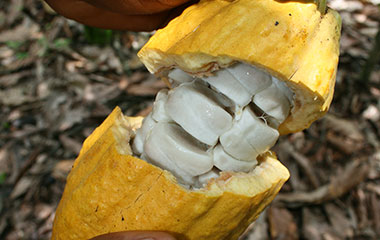Kumasi Drinks
As a company, ETG is focused on going beyond opportunistic trading by building local infrastructure, creating and maintaining strong on-the-ground teams within our origin countries, and directly exporting in origins rather than buying from international traders. We have more than 90 factories internationally that support local employment and local economies, and while as of today we do not process cocoa in-country, we are supporting local farmer groups to increase the value of their raw product and we are investing in the cocoa supply chain within origin countries.
Besides this, we buy directly from farmers, and we recruit local field trainers and support farmer groups with management trainings and sustainability activities. We also work to connect chocolate makers directly with farmer groups for a dedicated supply chain and additional support to farmers.
ETG and its associated sustainability foundation Beyond Beans enable several small and medium sized businesses that are focused on local processing, turning homegrown cocoa into chocolate and other cocoa-based products that are sold on the continent and internationally.
One such example is Kumasi Drinks, a Dutch social start-up in Ghana that is working with farmer groups from ETG's supply chains to turn cocoa fruit juice, a typically overlooked by-product of cocoa fermentation, into a commercially viable product that is sold both locally in Ghana as well as in The Netherlands. Kumasi purchases the cocoa pulp, works with farmers to turn it into juice, and markets it for sale.
So far, this additional source of income is reducing the Living Income Gap for farmers by 10%, with a potential to increase this to 30% when fully upscaled. Kumasi also strives to empower women, by specifically targeting women as collectors, processors and marketers of their cocoa juice.
The supply chain
The process begins in the Assin South District in Central Ghana where smallholder farmers from local Licensed Buying Companies FEDCO and Cocoa Merchants Limited grow cocoa. Extraction and processing takes place in the heart of the community, right next to project farms, where fruit pulp is collected and the juice is immediately extracted and cooled using solar-powered Community Mobile Processing Units (CMPUs). This process is facilitated by a technical process partner, Koa. The fresh juice is exported to The Netherlands and is then bottled by Kumasi, who take charge of processing, quality control and marketing.
The development of the supply chain as well as the marketing of Kumasi is receiving financial support from the Dutch Enterprise Agency (RVO), while the Royal Tropical Institute (KIT) and international non-profit Solidaridad support the project with impact studies and (women’s) group capacity building.
With support from IDH, the Sustainable Trade Initiative, we are currently in the process of expanding this project to Ivory Coast through a project called Cocoa Fruit Lab, where women's cooperative COVIMA in Bouafle will oversee the local production and processing. Although this production line will be of a smaller scale compared to the Ghana operations, it will be the first entirely women-owned micro-factory in Ivory Coast to produce sustainable cocoa, specialty chocolate and cocoa juice. Once again, this will serve both the local and international market. Notably, the juice will also be distributed at local school canteens.
Farmer ownership over the value chain
Strengthening farmer ownership in the upstream cocoa value chain is key to Kumasi's work, as farmer groups are empowered to become shareholders of the Kumasi juice product, rather than simply being suppliers of raw materials. This concept of ‘share trade’ ensures that farmer households also receive a share of the profit from the beverage itself.
For more information:
• Animation about the juice production process in Ghana:
Kumasi_Maak_Proces_EN_Titels-16-02 from Riga TV Engels on Vimeo.
• Kumasi website (in Dutch – an English version is in the making): https://kumasi-drinks.nl/



